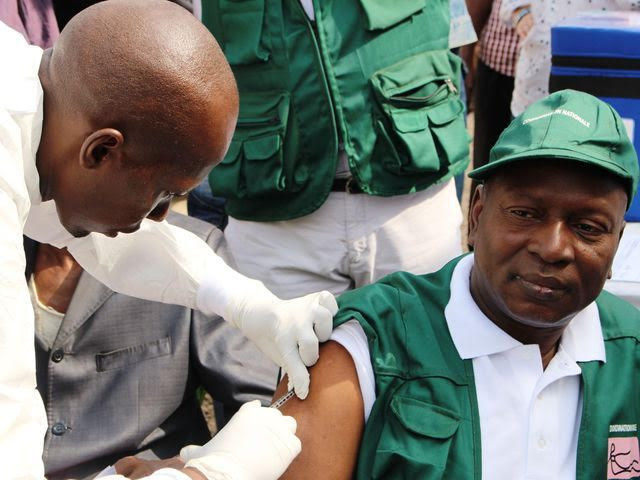Vaccine against Ebola has been found
VSV-ZEBOV - A vaccine against Ebola has been studied and achieved 100% effectiveness in preventing Ebola virus in trials in outbreaks in Guinea.
VSV-ZEBOV - A vaccine against Ebola has been studied and achieved 100% effectiveness in preventing Ebola virus in trials in outbreaks in Guinea.
Safety testing
Initial testing of the vaccine showed it was highly effective, providing rapid protection in 100% of cases. “This is a landmark study,” said Dr. Michael Osterholm, director of the Center for Infectious Disease Research and Policy at the University of Minnesota.
 |
| This man was vaccinated against Ebola on March 10, 2015. |
A man receives a vaccination on March 10, 2015, at a health center in Conakry, during the first clinical trials of the VSV-EBOV vaccine against Ebola virus. The vaccine was effective within 10 days of his injection. “This is a very promising development,” said Dr. Margaret Chan, Director-General of WHO. “Credit to the Government of Guinea, the people living in the communities and our partners in this project. An effective vaccine will be a very important tool for the current and future Ebola outbreaks.”
Recently, trials were conducted on 4,000 people with the cooperation of scientists, doctors, sponsors and pharmaceutical companies.
To test whether the vaccines were effective, clusters were randomly assigned to either receive the vaccine immediately or wait three weeks after Ebola was confirmed. Of the 2,014 people who received the vaccine immediately, none developed Ebola 10 days after vaccination – allowing time for immunity to build up. In the delayed cluster, 16 of 2,380 developed the disease. The results were published online in the Lancet medical journal.
“Silver bullet” against Ebola
“It is only when you see the devastating effects of Ebola on communities that you realise how terrible it is,” said Norway’s Foreign Minister Borge Brende. “If this vaccine works, it could be the silver bullet against Ebola, helping to control the disease in the future. I would like to thank all the partners who have contributed to this amazing result.”
Since late 2013, when the latest outbreak began in West Africa, there have been 27,600 cases of Ebola, including more than 11,000 deaths. Liberia has suffered the worst, with more than 4,800 deaths, although the outbreak has slowed in Sierra Leone and Guinea.
An effective vaccine could help control Ebola outbreaks by preventing people who are sick from infecting others around them, as well as protecting people at high risk of infection such as doctors, nurses, hospital staff and burial teams.
Doctors hope the Ebola vaccine will protect many people through a phenomenon called “herd immunity,” in which vaccination reduces the amount of virus in the environment, protecting those who do not yet have immunity.
“Too many people have died from this incredibly dangerous disease and it has caused a headache for health workers who feel helpless in the face of it,” said Bertrand Draguez, medical director of Doctors Without Borders. “More data is needed to tell us how effective it is in preventing the disease, but this is a unique breakthrough.”
Draguez suggested focusing on a group of people most at risk of Ebola infection that would be prioritized for mass vaccination, noting that outbreaks of the disease are in local communities rather than nationwide in any one country.
VSV-ZEBOV is expected to become the world's first licensed Ebola virus vaccine.
According to Health and Life






